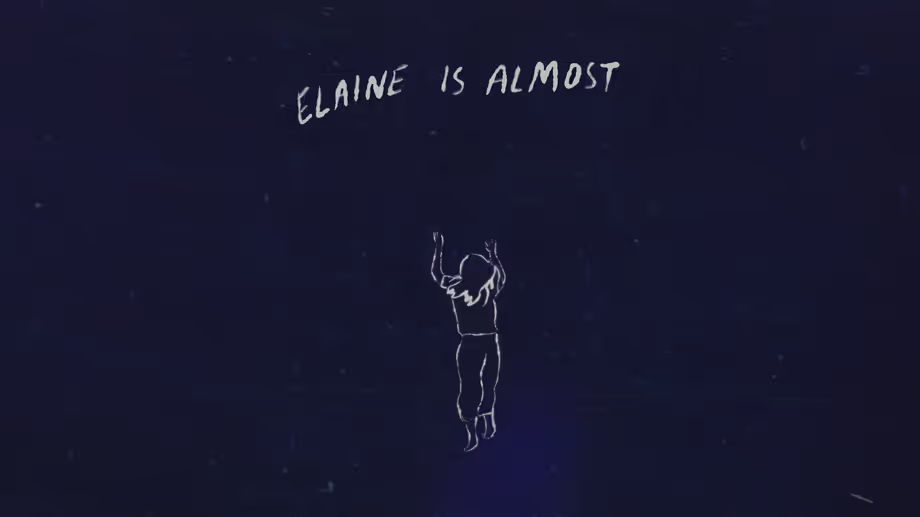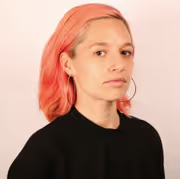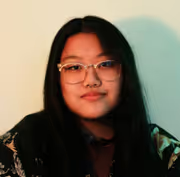Elaine is Almost: Lesson Plan
Overview

“Introduce yourself,” are the first words we hear and almost at the same time the notes of a piano playing and then the words themselves appear as white handwriting on a deep blue screen. But the voice might as well be saying, “I love you,” such is its tone and timbre. And really that is what the narrator is saying, for this is “Elaine is Almost,” a hybrid animation and live action documentary that explores the unconditional love in the relationship between two siblings. In these two short films, Emily Yue captures their sister Elaine on the eve of her 14th and 15th birthdays. In just eight minutes, Yue communicates a memoir’s worth of understanding about their sister; their relationship; their culture; their experience as the children of immigrants; and, of course, Elaine herself. The magic of this medium is that it brings us as viewers into the intimate space of conversation that feels like we are participants in a FaceTime or IG Live with Elaine. Emily Yue is a Chinese-American artist and filmmaker from North Carolina. Their work in documentary animation and interactive media explores the intersections of queerness, language, and technology through the lens of tenderness.
This is a fitting time for their work and for this project. The news media is focused on the theme of cultural and political division in the U.S., and the realm of social media is often viewed as the hive of that division. This film (and this lesson) lives outside of that dominant framing and lives into the truths of the authors’ life. Instead, the film reminds us that social media can also be a platform for vulnerability, for self-revelation, for providing a counter narrative to those that would tell a very different story about what our bodies mean in the world. It highlights one relationship and centers the voice of one young person, taking their voice seriously and presenting it respect. The film demonstrates the power of listening with love.
With “Elaine is Almost” as inspiration, this lesson will introduce students to the art and ethics of the interview. Students will learn and write their own ethical code of interviewing. Through a collaborative in-class project, students will work with a partner to co-create a set of interview questions, taking turns as interviewer and subject, thereby experiencing shared agency and accountability for the experience of asking and answering questions about oneself. Finally, students will conduct and record interviews with someone they consider important to their lives, applying the code that they developed, and sharing the final, recorded project to a class-specific Instagram account. This lesson works in person or on a digital platform; some of the tweaks to the format necessary to conduct it online will be left to each instructor. It is also one that could be expanded into a longer curriculum, especially with a focus on animation and visual editing. As it stands here, students will have the chance to take their projects in a journalistic or creative direction. They will be sure to leave it with a new relationship to the art of care, curiosity, and connection.
A Note On Technology and Accessibility
This lesson, as well as the others in the Otherly series, bring social media into the classroom. These lessons are designed to integrate ethical engagement on social platforms to complete the assignments. It will be important for you to check with your school or district for any regulations around classroom or in-school student social media use.In addition, this lesson entails the creation of a class Instagram account. In order to set this up, the teacher will need to set up an IG account which will be shared only to the class, with a username and password that students can all access. That said, while some of the content and theory of the lessons would be lost without the use of social media, students could complete the assignments using the photo and video tools on their phones. However! The lessons are intended to critique, engage, and potentially transform the use of social media. If possible, the lesson will be most transformative as a social media-based engagement. And with enough planning, you and your learning community can create an analogue version of this lesson with printed-out photographs, storyboards on large paper in the classroom, and using school-based technology to record and play videos in school.
A Note From Curriculum Creator, Jade Sanchez-Ventura
I believe in personal narrative. I think that to communicate the particular experience of a life and to tie it literally or intuitively to the histories--familial, cultural, societal--that have shaped us is an act of resistance that also makes for excellent storytelling. This conviction is the underpinning of my work as an educator: No matter the subject, I know that every young person has a singular, vital perspective to bring and my role is to act as a catalyst for their bursts of insight and inspiration. Sometimes (too often) my role is to help students recognize the power of their own insight and intelligence. As with all systems of our society, the classroom can also be a site of profound oppression and silencing. As one mentor told me, “You want your students to leave a classroom not thinking that you’re smart, but that they are.” Often that entails reminding myself that with every generation there are new methods of making and communication emerging; reminding myself to ask students about what is present and relevant to their daily lives.
Smartphones and apps and social media often feel like the epitome of a generational divide. Phones are banned from classrooms (including my own, generally), social media is demonized (even though we all use it), or if not demonized, trivialized--regarded as a cultural arena for entertainment and play, but not for serious study and critique. However, many of us, and certainly most young people, are daily crafting intimate narratives about their own lives on those very phones. Any minute on Instagram is one crammed with countless Stories, Posts, Live broadcasts from our lives. Yes, the celebrities and politicians and gatekeepers are there too, but one can easily ignore them and follow only the interpretations and explorations of regular folks like us.
Much has been made of the information bubbles made possible by social media. Certainly that is an important conversation to have, but for the purpose of this lesson (and it’s partner lessons featuring the Otherly documentary series), we have the chance to interrogate the vast options for self-expression and self-chronicling afforded by social media, in particular Instagram. I am enchanted by the truism that the more focused and personal a story, the more broadly it appeals. There is a magic that happens when an artist tells one small story honestly-It becomes a big truth that resonates for countless others.
“Elaine is Almost” is one of those stories. In these two four minute films an entire relationship is told. As a viewer, I felt as if I was sitting in the room with Elaine, looking at the art on her walls, walking with her as she answered her sister’s questions, asked and answered in a narration floating over the images. It reminded me that the phone I hold in my hand is a tool I can use to capture the power of everyday.


